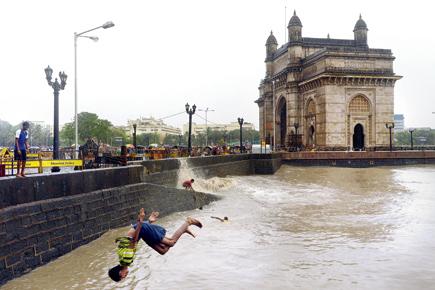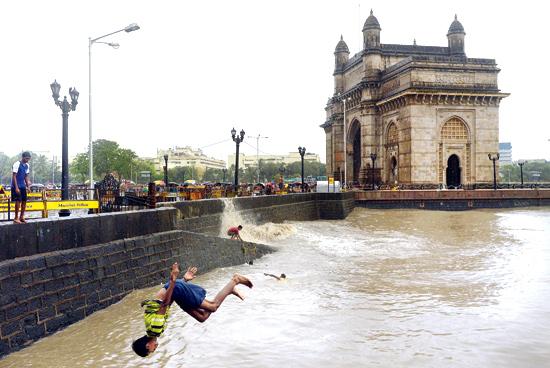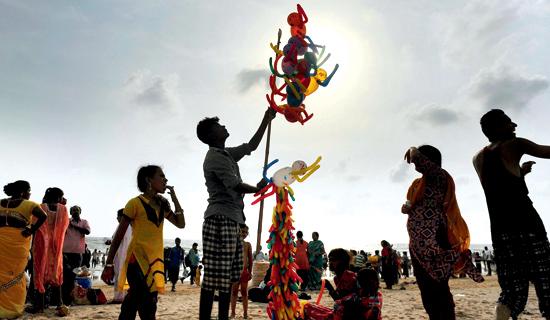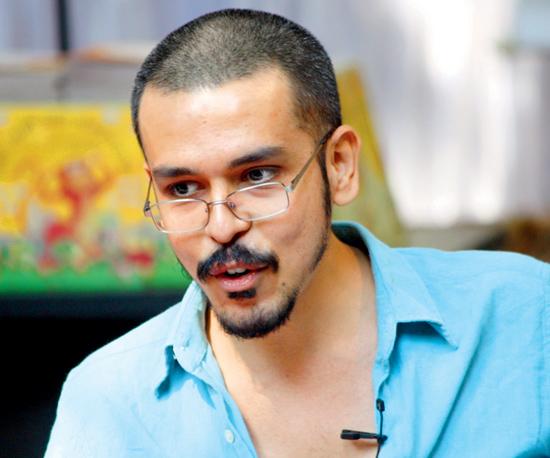Rickshaw drivers. Train bomb blast survivors. Idyllic singers. Flat seekers from the wrong community. Each story in Devashish Makhija's compilation speaks of a Mumbai or Bombay that we have encountered, experienced, smelt or tasted, for better or worse, at some point in our lives

Gateway of India
Q. Why 49 stories? Was there another story behind the number as well?
A. As much as I would like to say 'yes', the answer is 'no' (laughs). I just kept writing all these years and when I collated my stories there were 49 of them that seemed like they belonged in a collection. I tried very hard to come up with some sort of reason for this number because it is an odd and large number of stories for one book. But try as I might, I couldn't. Since nothing about this book is forced I decided to let this be. It is 49 because it is 49. Quite like the answer to life, the universe and everything is 42. There is no deeper reason. Sometimes, that's the most profound of reasons, no?
ADVERTISEMENT

A young child does a somersault into the waters of the Arabian Sea at the iconic Gateway of India. Pic/AFP
Q. Who or what triggered off this writing adventure that began six years ago?
A. A spate of shelved films. I came to Bombay to make films (like every other chap who comes here). I had a rough spell exactly six years ago when my YashRaj animation film (which I was writing and directing), then many films that I wrote, including Anurag's Doga, Abhik Mukherjee's Bhoomi, MF Hussain's biopic and about ten other films just kept getting shelved one after the other. But my spring well of stories wasn't drying up. It was a rough call to make, what to do with all these stories that keep coming to me. Because converting each one into a film that doesn't get made is a recipe for suicide! So I started writing a lot of them as short stories, of varying lengths, just so I could give birth to them and get them out of my system. Because to allow them to stay inside, unborn, is a certified cause for incurable insomnia. Every time I wrote out one story I slept like a baby that night. So, to cut a long story short (figuratively!) this writing adventure was triggered off by a desperate desire to sleep!

A balloon seller at Juhu beach. Forgetting looks at Mumbai's many hues and shades, and the people who create those. Pic/AFP
Q. Your characters, be it Nandu, Rahim or Manda are earthy, believable. You can almost imagine having met them at some point in the city. Tell us about that journey of sifting out the most engaging ones for this book.
A. As a film writer, I believe that 'characters' matter more than 'stories'. I've tested this on people. Ask anyone who has seen The Godfather (and liked it) - to tell you the 'story' of the film. I guarantee they'll take a few minutes to be able to recount the story, and even then they won't get it absolutely right. But ask them to tell you about the character(s) they liked in the film and they can go on and on about what they liked about him/her and about that particular scene where the character did/said something memorable. You can try this with Sholay or with 100 Years of Solitude and the results will be the same. We return to stories not for the stories, but for the characters, and how they resonate with us. The story ceases to surprise after the first watch/reading. There's no fun in familiarity in a story. But with a character the fun IS in the familiarity. It is in knowing Marlon Brando's character will do this in this scene and you're waiting for it to come because you want to see him do it again. You want to see Amitabh Bachchan as Jai toss that double-headed coin. And so, I spend a lot of my writing time (perhaps 75% of it) creating characters and then allow them to change/shape/lead the story. Perhaps why Nandu, Manda, Rahim and co. seems real and relatable - because I haven't created their trajectories. They have. I've merely created them

Devashish Makhija
Q. Most of your stories have a tinge of sadness, and yet the human spirit wins the day, somehow. Did you realise this at any point of working on this book?
A. It's probably my film writing creeping in again, subconsciously. In cinema (especially the mainstream) no matter how sad/dark the story there needs to be some spark of 'life affirmation' for people to want to spend money and come watch the film. Ok, this isn't something I believe, no. This is something producers tend to believe and then make you work that into the resolution/culmination of your stories. Somewhere then perhaps although most of my stories are about the real tribulations of normal people (and those are always sad and hard and heartbreaking) I tend to seek a small glimmer of hope through the hopelessness to make the story worthwhile of a revisit someday for the reader/audience.
Although, to be fair to me, all stories aren't that way. I wrote short stories so I wouldn't have to pander to a producer's prerogative in the matter. By/Two, Butterflies on strings, Solving crosswords; in fact, half the stories in the book are true to the sadness of their characters. None of our lives are bereft of sadness, so why should our realistic stories be? They are real because they are sad. And I believe in moving ahead in life along with my sadness, not despite it. My sadness - as much as my happiness - shapes me. As it does all of us.
Q. And finally, what is more difficult to forget: the living or the dead?
A. The dead are gone. And I believe (very strongly) that human beings are capable machines. We can move on from anything / adapt to anything very fast. When we lose someone (to death) we want to hold on to the memory of the person etc but despite that life has a way of making us move on very quickly and very surely.
We can't miss the dead for too long, especially in this modern world, which is splitting at the seams with distractions of all kinds. So, I'd say, it's much harder to forget the living. You know you can reach out to them, more so today than ever before. You can stalk them on Facebook, for god's sake! How hard it must be then to forget the living? The world we've made for ourselves just won't allow us to do that. But the dead, the world we're made for ourselves just won't allow us to remember them for long enough.
Although, this is a pattern I'm trying hard to rebel against, personally. So far, I've not been too successful.
 Subscribe today by clicking the link and stay updated with the latest news!" Click here!
Subscribe today by clicking the link and stay updated with the latest news!" Click here!






